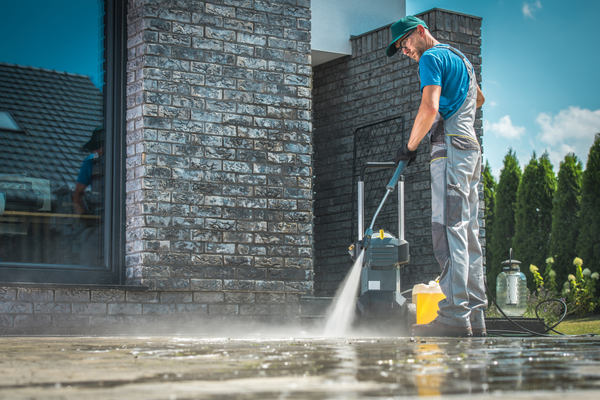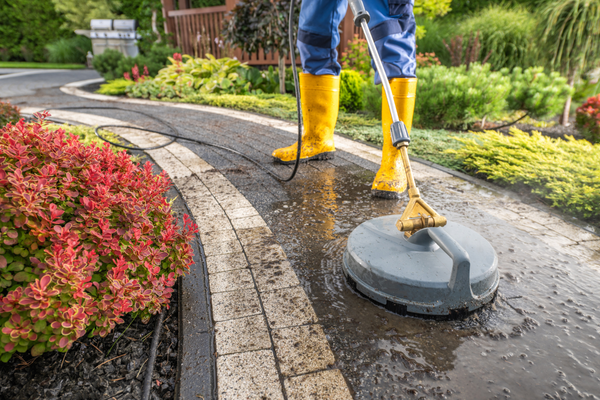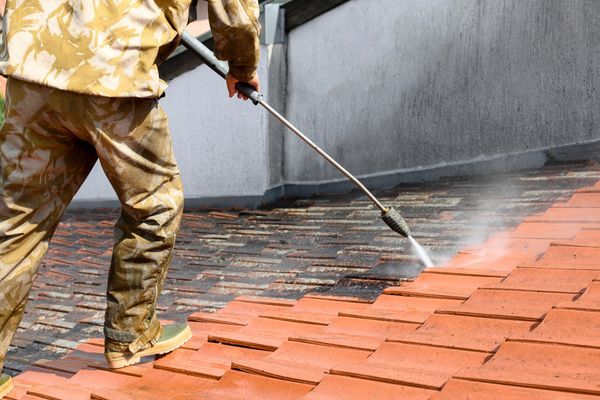Every homeowner in Rock Hill, SC shares a common vision: a property that gleams with pride, its surfaces bright and clean. You want to see your driveway free of stains and your siding looking fresh. The thought of achieving this with a power washer seems quick and satisfying. Then, a different thought creeps in. You have heard stories from neighbors or seen pictures online of disastrous DIY projects. Paint stripped from siding in jagged lines, window seals broken and leaking, and wooden decks splintered beyond repair. These cautionary tales can make anyone hesitate.
The confusion starts with the language people use. The terms “pressure washing” and “soft washing” get tossed around as if they mean the same thing. They are not the same. They are fundamentally different approaches to exterior cleaning. Choosing the wrong method for a given surface is not a simple mistake; it can lead to permanent, expensive damage to your home. This guide is here to clear away that confusion for good. We will define both soft washing and pressure washing in simple terms. We will look at the science that makes each one work. We will give you a straightforward checklist to help you understand which technique is the safest and most effective for every part of your home’s exterior.
Table of Contents

Soft Washing vs. Pressure Washing – What’s Best for Your Home?
What is the Main Difference Between Soft Washing and Pressure Washing?
Pressure washing is a cleaning method that uses the immense force of high-pressure water to physically remove dirt, grime, and stains from durable surfaces. In contrast, soft washing uses a very low-pressure water stream, gentler than a garden hose, to apply a specialized cleaning solution that kills organic growth before it is rinsed away.
Key Differences at a Glance:
- Cleaning Power: High-Pressure Water Force vs. Specialized Cleaning Solutions
- Water Pressure: Very High PSI (1500-4000+) vs. Very Low PSI (Under 500)
- Primary Use: Cleaning tough, durable surfaces (concrete, brick) vs. Cleaning delicate, fragile surfaces (siding, roofs).
- Main Goal: Remove embedded dirt and stains vs. Kill and remove organic growth (mold, algae, moss).
When Should You Use High-Pressure Washing?
High-pressure washing has a definite and important place in exterior cleaning. Its power is perfect for hardscapes and surfaces that can withstand a forceful blast. This method works by using water as a physical tool to scour away packed-in dirt, oil stains, and other tough blemishes. The results on the right surface can be dramatic, restoring its original look. For certain tough jobs, only a true pressure washing service has the power to get deep into the pores of the material.
Surfaces Suitable for High Pressure:
- Concrete driveways, sidewalks, and patios.
- Brick and paver surfaces (with stable mortar/joints).
- Stone walls and walkways.
- Stripping old, peeling paint from surfaces before repainting.
What are the Risks of Using High Pressure on the Wrong Surface?
The very power that makes pressure washing effective on concrete is what makes it so dangerous for other parts of your home. The intense force is not forgiving. Applying that kind of pressure to your driveway might be fine, but aiming it at your house siding is a recipe for disaster. The water jet can easily get underneath the siding panels, forcing water into your home’s wall cavities. This trapped moisture can lead to hidden mold, mildew, and wood rot, creating problems far worse than the original dirty siding.
This is a common issue seen by the professionals at Carolina Power Washing. Windows are another vulnerable area. The high pressure can break the airtight seal between the panes of glass in double-paned windows. This breakage allows moisture to enter, leading to permanent fogging and condensation that cannot be fixed without a full window replacement. Wooden decks and fences are also at high risk. A pressure washer can leave permanent “etching” marks or cause the wood to splinter and develop a fuzzy, damaged texture known as “furring.” It essentially tears the wood fibers apart. Even durable materials like brick are not immune. If the mortar between the bricks is old or weak, a pressure washer can blast it right out, compromising the structural integrity of the wall. Using the wrong method is a gamble that can lead to irreversible harm.
When is Soft Washing the Only Safe Option?
The soft washing service was developed as a direct answer to the damages caused by high pressure on delicate surfaces. It is a more scientific, nuanced approach to cleaning. It recognizes that many of the dark stains on a home’s exterior, especially in the humid climate of Rock Hill, SC, are not just dirt. They are living organisms like algae, mold, mildew, and lichen. Blasting them with water alone is not the answer. Carolina Power Washing has seen firsthand how this method protects a home’s value.
Common Delicate Surfaces:
- Roof Shingles: A soft wash roof cleaning is the only method approved by the Asphalt Roofing Manufacturers Association (ARMA). High pressure violently strips away the protective granules that shield the asphalt from the sun, drastically shortening the roof’s lifespan and voiding its warranty.
- House Siding: Soft washing gently cleans vinyl, wood, stucco, Hardie board, and painted exteriors. It removes dirt and organic stains without chipping paint, forcing water into cracks, or warping the material. A proper house washing service relies on this gentle technique.
- Wooden Decks & Fences: This method cleans the wood by killing the mold and mildew that cause discoloration. It avoids splintering the wood, preserving its surface and preparing it perfectly for a new coat of stain or sealant.
- Screened-in Porches & Lanais: The low pressure gently cleans delicate screen materials and their frames without causing rips, tears, or bending.
- Outdoor Furniture: It safely removes grime and mildew from plastic, wood, and metal patio furniture without stripping paint or causing damage.

Why is Soft Washing More Effective at Removing Mold and Mildew?
There is a simple analogy to understand the difference between the two methods when fighting organic growth. Using high pressure on mold and algae is like mowing a weed. It trims the top off, making it look better for a short time, but the root system remains completely intact. The growth comes back quickly, sometimes even thicker than before.
Soft washing works more like a targeted weed killer. The specially formulated, biodegradable cleaning solutions are the core of the soft wash pressure washing process. These solutions penetrate the surface of the material and eliminate the mold, mildew, and algae at the root. The organism is completely killed. After the solution has had time to work, it is gently rinsed away with low-pressure water, taking all the dead organic matter with it. This approach provides a much deeper, longer-lasting clean because the problem has been solved, not just temporarily hidden. Homeowners are often surprised at how long their home stays clean after a professional soft washing company treats the property.
Which Cleaning Method is Better for the Environment?
Both cleaning methods can be performed in an environmentally conscious way when handled by trained professionals. Each has its own environmental considerations.
Pressure washing on its own typically uses more water. The process relies on a high volume of water being forced through the machine to create the cleaning power. It often uses fewer, if any, chemical cleaners.
Soft washing, on the other hand, uses significantly less water. The water is mainly a carrier for the cleaning solution and a way to rinse the surface afterward. Reputable companies like Carolina Power Washing, with over 15 years of experience, use water-based, biodegradable cleaning solutions. These professional-grade solutions are designed to break down and become harmless to the environment. Technicians take great care to pre-saturate plants and landscaping with fresh water and manage runoff, protecting the local ecosystem, pets, and your family. For tough, non-organic stains on hardscapes, a professional concrete cleaning service might use high pressure, while soft washing is reserved for the house itself.
Protecting Your Rock Hill Home
The main lesson is clear: pressure washing cleans with force, while soft washing cleans with science. The surface being cleaned should always determine the correct and safe method. Making this choice is not just about getting a good clean. It is about actively protecting the value, structural integrity, and beauty of your home from damage that can be very expensive and sometimes impossible to reverse.
What’s one surface on your home you’ve been afraid to clean? Let us know in the comments!
Don’t risk damaging your property. Contact the team of cleaning experts at Carolina Power Washing today. You can get a free evaluation to determine the safest and most effective method for your home’s specific needs.

